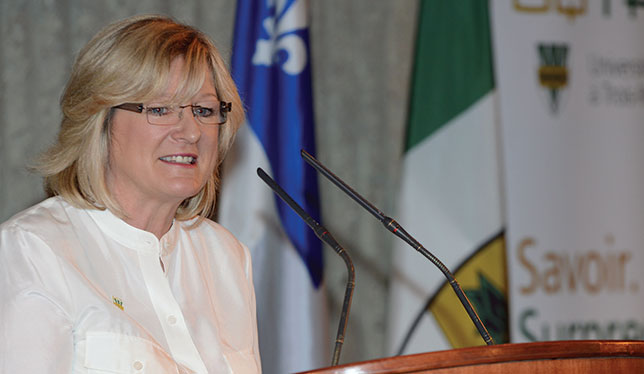Carmen Dionne recently became the first UNESCO Chairholder at the Université du Québec à Trois-Rivières, an achievement that opens the door to new international collaborations.
Dr. Dionne, a professor in the department of psychoeducation at UQTR, will use the position to focus on the developmental screening and assessment of children up to six years of age, in terms of not only gross and fine motor skills but also communication, socialization and general independence. This entails designing tools for the identification of developmental delay so as to make early intervention possible. There are 653 UNESCO Chairs listed worldwide and UQTR’s is the first to be dedicated to early childhood development.

“By collaborating with researchers from numerous countries via the Chair, we aim to compare and stimulate further thinking about the use of measurement instruments and the implementation of screening and assessment practices for children in various settings,” Dr. Dionne said.
Including the one awarded to Dr. Dionne, 13 of Canada’s 19 UNESCO Chairs are based out of Quebec institutions. Of those 13, however, 10 are based in Montreal and one in Quebec City. Only two, a post at the Université du Québec à Rimouski and this new chair at UQTR, are based at institutions outside of major cities.
“It’s good news for the university,” Dr. Dionne said. “It recognizes the quality of research being done outside of major urban centres. She noted that she received a quick decision on her candidacy for the chair, which she had been cautioned would be a long process. “This shows that our research addresses a real need.”
The UNESCO chair will also serve as a model for international collaborative projects at UQTR, Dr. Dionne said. “UQTR has worked for some time to build relationships with foreign universities, and the UNESCO Chair will help maximize these networking efforts.”
Students stand to benefit the most from UQTR’s UNESCO Chair, which will largely serve to support training activities for graduate students. “Members from the various countries involved in the chair all have students working on projects dealing with screening, assessment and intervention practices for young children,” said Dr. Dionne. “They will now have opportunities to interact with students and researchers from abroad.”
UQTR and the UQTR Foundation contributed most of the nearly $700,000 to fund the UNESCO Chair. The appointment lasts for four years, after which point it will be reviewed.